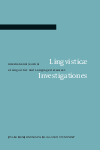
Linguisticae Investigationes
Scope & Guideline
Exploring the depths of language and its complexities.
Introduction
Aims and Scopes
- Contrastive Linguistics:
The journal emphasizes the comparative study of languages, particularly French and Spanish, exploring how linguistic elements function differently across these languages. - Discourse Markers and Pragmatics:
A core focus is on the role of discourse markers in communication, examining their pragmatic implications and how they shape meaning within conversations. - Phraseology and Idiomatic Expressions:
The journal investigates the use of phraseological units in oral and written interactions, highlighting their significance in conveying meaning and cultural nuances. - Cataphora and Anaphora:
Research on cataphoric and anaphoric relations is prominent, exploring how these linguistic features contribute to coherence and cohesion in discourse. - Experimental and Distributional Methods:
Methodologically, the journal employs both experimental approaches and distributional analyses to investigate linguistic phenomena, ensuring a robust examination of language use.
Trending and Emerging
- Interdisciplinary Approaches to Linguistics:
There is a growing trend towards integrating insights from other disciplines, such as cognitive science and sociolinguistics, to enrich linguistic analysis and understanding. - Digital Communication and Emoji Use:
Research on the role of emojis and digital discourse markers is on the rise, reflecting contemporary communication practices in the digital age and their linguistic implications. - Child Language Acquisition:
Studies focusing on language acquisition in children, particularly in relation to phraseology and interaction, are becoming increasingly prominent, indicating a shift towards developmental linguistics. - Pragmatic Markers in Multilingual Contexts:
The exploration of pragmatic markers within multilingual settings is emerging as a significant theme, highlighting the complexities of language use in diverse communicative environments.
Declining or Waning
- Traditional Syntax Analysis:
There has been a noticeable decrease in papers focusing solely on traditional syntactic structures, as the journal pivots towards more pragmatic and functional analyses. - Historical Linguistics:
Themes related to historical linguistic changes and diachronic studies have become less frequent, suggesting a waning interest in tracing linguistic evolution over time. - General Semantics:
Broad discussions on general semantics without a focus on specific linguistic contexts or applications appear to be declining, as the journal emphasizes more targeted and empirical studies.
Similar Journals
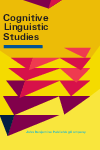
Cognitive Linguistic Studies
Advancing Insights in Cognitive LinguisticsCognitive Linguistic Studies is a prestigious journal published by JOHN BENJAMINS PUBLISHING CO, dedicated to advancing the interdisciplinary field of cognitive linguistics. With an ISSN of 2213-8722 and an E-ISSN of 2213-8730, the journal serves as an essential platform for the dissemination of high-quality research that delves into the intricate relationships between language, thought, and cultural contexts. Located in the vibrant academic milieu of the Netherlands, this journal has gained recognition for its impactful contributions, reflected in its respectable Q2 category ranking within the field of Linguistics and Language as of 2023. Redesigned to accommodate a broader audience, the journal welcomes original research articles, reviews, and theoretical discussions that bridge cognitive science and linguistic inquiry. As the journal continues its trajectory of growth, being indexed with a solid Scopus rank of #459 out of 1167 in the social sciences, it remains a vital resource for researchers, professionals, and students eager to explore the dynamic interplay between cognition and language.

LINGUISTICS AND PHILOSOPHY
Advancing Interdisciplinary Dialogues in Language and PhilosophyLINGUISTICS AND PHILOSOPHY, published by Springer, is an esteemed peer-reviewed journal that serves as a vital interdisciplinary platform for scholars engaged in the intricate interplay between linguistic and philosophical inquiry. With a strong impact factor, this journal falls under the prestigious Q1 category in both Linguistics and Language and Philosophy, illustrating its significant contribution to these fields. The journal's scope encompasses a wide array of topics, including semantics, pragmatics, language theory, and the philosophical implications of linguistic theory, making it essential reading for researchers and professionals alike. Operating in the vibrant academic context of the Netherlands, LINGUISTICS AND PHILOSOPHY has maintained a vital connection to current trends in language studies and philosophical thought since its inception in 1977. With consistently high rankings in Scopus, the journal reflects its commitment to disseminating high-quality research that influences ongoing discussions in both disciplines. Even without Open Access options, its relevance and robust editorial standards continue to attract a global readership dedicated to advancing knowledge at the intersection of linguistics and philosophy.

Contrastive Pragmatics
Pioneering empirical investigations in contrastive linguistics.Contrastive Pragmatics, published by BRILL, is a premier open-access journal dedicated to advancing the field of linguistics through a unique focus on the pragmatic aspects of language comparison and contrast. Since its inception in 2020, this journal has rapidly established itself as a vital resource for scholars interested in the intricate interplay between language use, culture, and communication, reflecting the increasing importance of pragmatics in understanding cross-linguistic phenomena. With its Q2 ranking in Linguistics and Language as of 2023, and its commendable positions within Scopus ranks, Contrastive Pragmatics offers a platform for innovative research that not only highlights theoretical developments but also invites empirical investigations across languages and cultures. The journal's commitment to open access ensures that cutting-edge research is freely available, fostering collaboration and knowledge sharing among researchers, professionals, and students alike. For those looking to stay at the forefront of linguistic research, Contrastive Pragmatics is an essential avenue for exploration.
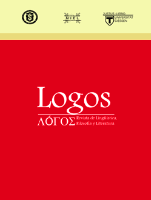
Logos-Revista de Linguistica Filosofia y Literatura
Cultivating Scholarly Impact in Arts and HumanitiesLogos-Revista de Linguistica Filosofia y Literatura, published by UNIV SERENA, FAC HUMANIDADES in Chile, stands as a distinguished academic journal dedicated to the fields of linguistics, philosophy, and literature. With an ISSN of 0716-7520 and an E-ISSN of 0719-3262, this Open Access journal has been facilitating the dissemination of innovative research since 2012. Notably recognized within the Q2 category for Linguistics and Language, the Q1 category for Literature and Literary Theory, and another Q2 in Philosophy for 2023, it reflects a robust commitment to intellectual rigor and scholarly impact. The journal's rankings in Scopus highlight its significance in the Arts and Humanities' landscape, with impressive percentiles in multiple categories, affirming its vital role in advancing academic discourse. Serving as a crucial platform for researchers, professionals, and students, Logos encourages interdisciplinary dialogue and exploration, thereby enriching the understanding of language, thought, and narrative. The publication's convergence of diverse academic traditions and progressive themes positions it as a pivotal resource for contemporary scholarship.

Voprosy Yazykoznaniya
Fostering Scholarly Dialogue in Language StudiesVoprosy Yazykoznaniya, published by the esteemed Russian Academy of Sciences and the State Academy of Humanities (GAUGN), stands as a leading journal in the field of linguistics and language studies. With an impressive Q2 rank in Linguistics and Language for 2023 and a strong position within Scopus rankings, this journal fosters scholarly dialogue and pushes the boundaries of linguistic research by providing a platform for innovative studies, reviews, and analyses. Although not open access, its publication ensures high academic standards and visibility within the global academic community. Researchers, professionals, and students alike can benefit from the rich insights and diverse perspectives presented in this journal, serving as a vital resource for anyone interested in the intricacies of language and its role in society. Operating since 2009 and continuing to 2024, Voprosy Yazykoznaniya is an essential reference point for contemporary linguistic scholarship in the Russian Federation and beyond.

Romanica Olomucensia
Exploring the Depths of Romance StudiesRomanica Olomucensia is a distinguished open-access academic journal published by Palacky University, Department of Romance Philosophical Faculty in the Czech Republic. With its commitment to fostering advanced research in the fields of Literature and Literary Theory as well as Linguistics and Language, this journal aims to provide a platform for scholars, researchers, and students to share their findings and insights. Since its inception, Romanica Olomucensia has consistently been recognized for its quality, securing a position in the Q2 category in the literature domain and achieving a Q3 ranking in linguistics per the 2023 category quartiles. The journal is indexed in Scopus, reflecting its standing in the academic community, with impressive ranks in various arts and humanities disciplines. It has been an open-access journal since 2018, promoting unrestricted access to all its publications, thus enhancing global academic outreach. With a focus on innovation and interdisciplinary studies, Romanica Olomucensia serves as an essential resource for anyone interested in the dynamic interplay of language and literature.
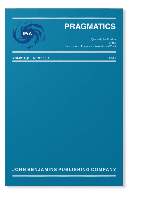
Pragmatics
Unlocking the complexities of human interaction.Pragmatics is a premier international journal dedicated to the exploration and development of the field of pragmatics, published by John Benjamins Publishing Co. This esteemed journal, with an ISSN of 1018-2101 and E-ISSN 2406-4238, offers a vital platform for interdisciplinary research in linguistics, philosophy, and social sciences, making significant contributions to scholarly discourse since its convergence in 2005. Recognized for its high-impact research, Pragmatics boasts a prestigious Q1 ranking in both Linguistics and Language and Philosophy as of 2023, with impressive Scopus rankings that place it in the top percentiles of its categories. The journal aims to enhance understanding of communication in diverse contexts and encourages submissions that reflect innovative theoretical perspectives and empirical findings. Although not an open-access journal, it is essential for researchers, professionals, and students seeking to stay at the forefront of pragmatic studies and related disciplines. With its base in Belgium and an address in Amsterdam, Pragmatics continues to influence global conversations in the humanities and social sciences.
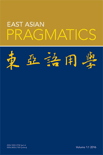
East Asian Pragmatics
Empowering Research in Communication and CultureEast Asian Pragmatics, published by EQUINOX PUBLISHING LTD, serves as a critical platform for interdisciplinary research in the fields of Communication, Cultural Studies, and Linguistics. With an ISSN of 2055-7752 and an E-ISSN of 2055-7760, this journal has established significant relevance, evidenced by its Q2 and Q3 classifications in critical academic categories for 2023. Spanning the years from 2018 to 2024, East Asian Pragmatics aims to advance understanding of pragmatics within the context of East Asia, facilitating scholarly discourse that bridges linguistic insights with cultural phenomena. Its Scopus ranking highlights its growing importance, particularly in cultural studies and linguistics where it ranks in the top half of its categories. Researchers, professionals, and students are encouraged to explore the wealth of knowledge and unique perspectives presented in its articles, contributing to the vibrant tapestry of East Asian linguistic and cultural studies.

Archivum
Fostering Innovation in Linguistic and Literary StudiesArchivum, published by UNIV OVIEDO in Spain, stands as a vital resource in the fields of Linguistics and Language as well as Literature and Literary Theory. With an impact factor reflective of its commitment to scholarly excellence, this journal has proudly maintained an Open Access model since 1951, ensuring that its rich repository of knowledge is freely available to researchers, professionals, and students alike. Covering a converged span from 2019 to 2023, Archivum has strategically positioned itself within the academic milieu, currently categorized in the Q4 for Linguistics and Language and Q3 for Literature and Literary Theory as of 2023. The journal is indexed in Scopus, with rankings that reflect its growing influence, such as #690 in Literature and Literary Theory and #887 in Language and Linguistics. Despite its challenges in visibility, Archivum remains essential for those seeking to engage with contemporary discussions and research within the humanities. Located in the heart of Asturias, it embodies the scholarly spirit of Spain, fostering a collaborative environment for innovation and inquiry in linguistic and literary studies.

Iberica
Democratizing access to cutting-edge linguistic research.Iberica, an esteemed journal published by AELFE, serves as a vital platform for scholarly discourse in the fields of linguistics and language studies. With its inception as an Open Access publication in 1999, Iberica has democratized access to high-quality research, fostering an environment of collaboration and innovation among researchers and professionals alike. Based in Spain at UNIV JAUME I, the journal has witnessed a remarkable ascent in the 2023 category quartiles, achieving a Q1 ranking in Linguistics and Language. Furthermore, its impressive Scopus rankings place it in the top 25% within both the Arts and Humanities and Social Sciences disciplines. Covering a diverse range of topics from theoretical linguistics to applied language studies, Iberica offers a compelling opportunity for academics seeking to contribute to and engage with contemporary issues in the linguistic landscape. As it converges in its publishing years from 2008 to 2024, it continues to set the standard for excellence within its field, making it an essential resource for students, researchers, and language professionals.